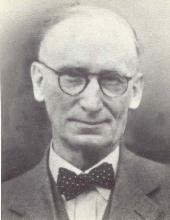I am aware, and have had correspondence with persons who are with the Exclusive Brethren and related systems. I sorrow over those who have been side-tracked into sectarian error, claiming their way, and their apostolic leadership, is the one and only right Christian path. My concern is not so much that they eschew normal relationships with other Christians, but that they adhere to a corruption of the wonderful gospel of the grace of God. We might just feel sorry for them, but it is serious. Paul said, ‘But though we, or an angel from heaven, preach any other gospel unto you than that which we have preached unto you, let him be accursed. As we said before, so say I now again, If any man preach any other gospel unto you than that ye have received, let him be accursed’ (Gal 1:8-9). I am seeking the guidance of the Holy Spirit, and of others who are familiar with these groups of Christians, as to how to help our brethren in the spirit of grace.
It has been said that if we go astray, we start by going astray as to the gospel. It is easy to look at a wrong system and judge it by the outward works. Indeed, the Lord said, ‘By their fruits ye shall know them’ (Matt 7:20). You see a system marked by legality, authoritarian leadership standing between the person and the Lord, and the rejection and despisal of others for whom the Lord paid an enormous price. Persons caught up in that system must feel obliged to follow it in order to assuage their guilt. If so, they cannot have peace with God. They must be defective in their appreciation of the glad tidings.
Do they believe that our sins were borne by our Lord Jesus and His whole atoning work was complete when He suffered being forsaken by God in the three hours of darkness on the cross? Or did the ‘abandonment’ – the word used by Taylor – extend to the resurrection, three days later. If the latter were true, then our Lord would have gone into death with sin upon Him. He could not have therefore been the ‘offering without blemish’ (Lev 9:2). He could not have atoned for our sins.

I believe, and this is supported by scripture – ‘His own self bare our sins in his own body on the tree’ (1 Peter 2:24), that He laid down His life in communion with His Father. James Taylor Senior (1870-1953), whose ministry was totally different from his son’s, said , ‘On the cross you can understand that the thought of relationship ceases when He was abandoned. When the abandonment is over He prayed to the Father and said, ‘Father, into thy hands I commend my spirit’ (Luke 23:46). But during the forsaking there could be no link. You could not have atonement if there were. That would be in the three hours. ‘Thou hast heard me from the horns of the unicorns. I will declare thy name unto my brethren: in the midst of the congregation will I praise thee’ (Psalm 22:21-22). The answer to God hearing Him from the horns of the unicorns is resurrection. The cry would be after the three hours of darkness. God would not leave Him in the meshes of the power of evil here. He was heard from that point.
He was completely forsaken, and this cannot be emphasised too much. He, as bearing sin, was under God’s displeasure at that time; there was total abandonment, otherwise there could not be a true dealing with sin. At our best, none of us judges sin rightly. The idea in atonement is that sin was measured not only by God, but by Man. On the cross the Lord fully measured sin according to what it is in God’s account; we never could do that. At the cross you have a Man estimating it infinitely. He estimated it according to God’s estimate of it, and removed it accordingly; so that it is only on the cross you have a true estimate and judgment of sin.’
The message is clear, even if the language is a bit difficult.
I am sure that Jim Taylor (JTJr) and his followers did not, or do not, deny Christ’s atoning work. But what does that error lead to? It leads to the making of the ‘abandonment’ the standard for separation. Instead of the work completed on the cross, they say that there was no communion until the resurrection. ‘No communion’ then is made to affect the relationships even between believers not walking in the same pathway and even in families. It is a complete despisal of God’s grace.
And we all know of the heartache that ensued.

